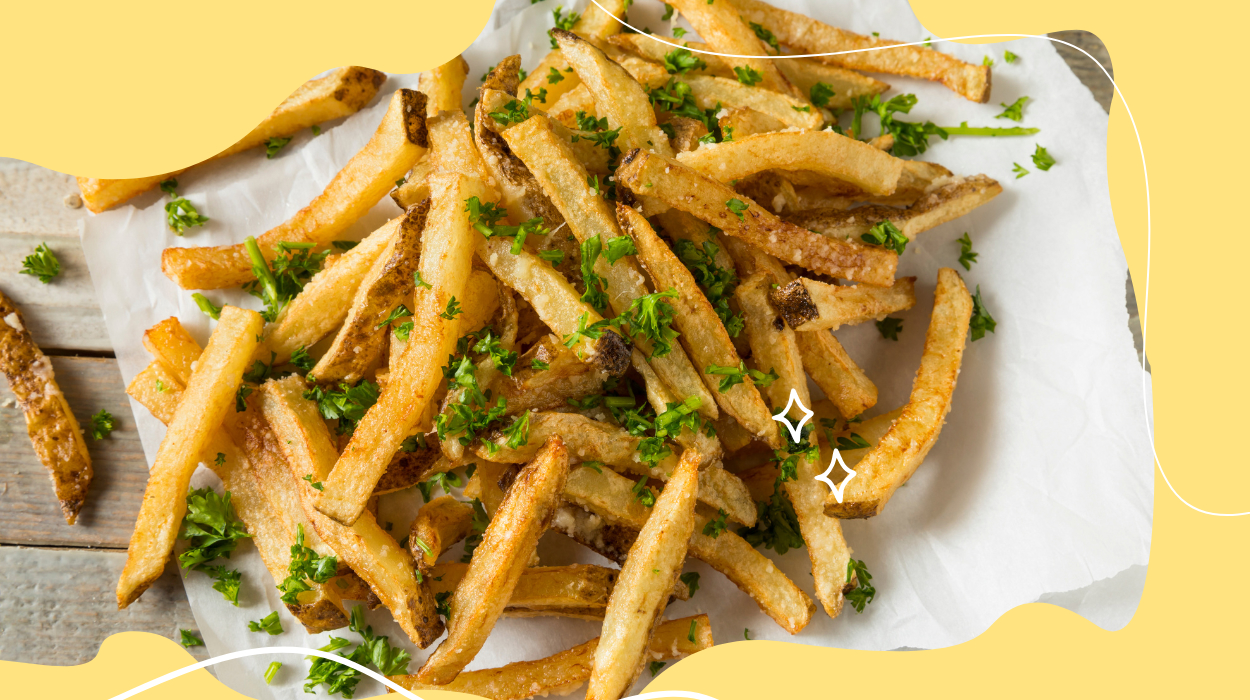 Expert's opinion
Expert's opinion
Expert's opinion
The article is a subjective view on this topic written by writers specializing in medical writing.
It may reflect on a personal journey surrounding struggles with an illness or medical condition, involve product comparisons, diet considerations, or other health-related opinions.
Although the view is entirely that of the writer, it is based on academic experiences and scientific research they have conducted; it is fact-checked by a team of degreed medical experts, and validated by sources attached to the article.
The numbers in parenthesis (1,2,3) will take you to clickable links to related scientific papers.
Are French Fries Gluten-Free? Answers & Tips For 2024

French fries, those irresistibly crispy strips of potato goodness, have become a staple in the culinary world. Whether you enjoy them at a gourmet restaurant, a bustling fast-food chain, or in your kitchen, it’s hard to resist their savory allure.
But if you’re following a gluten-free diet, you may wonder, are french fries gluten-free? In this article, we’ll bite into the french fries world to explore the factors that can affect their gluten-free status. We will provide tips to avoid cross-contamination and ensure your fries are always celiac-friendly. In this article, you can also find examples of other comforting snacks to add to your gluten-free repertoire. Keep reading for more.
Are French Fries Gluten Free?
Yes, french fries can be gluten-free. However, it depends on how they are prepared. French fries made from fresh potatoes and cooked in dedicated or air fryers without topping or seasonings containing gluten are typically gluten-free. The risk of gluten contamination happens when they are cooked in shared fryers and topped or coated with gluten-containing ingredients.
Do French Fries Have Gluten?
With their simple and straightforward potatoes, oil, and salt ingredients, french fries might seem like a safe bet for those following a gluten-free diet plan. After all, potatoes are naturally gluten-free, so it would be logical to assume that French fries are, too. Unfortunately, that’s not always the case.
One of the main concerns regarding gluten in french fries or sweet potato fries is the risk of cross-contamination.[1] In restaurants or fast-food chains, french fries are often cooked in shared fryers, where a variety of other gluten-containing items like chicken nuggets, onion rings, or breaded foods are also fried. Cross-contamination can occur when the gluten particles from other foods come into contact with the french fries.
Homemade French fries are a different story. By preparing them from scratch in your own kitchen, you can choose the type of potato flavors and the cooking method while ensuring they are completely gluten-free.
Alternatively, you can opt for gluten-free frozen french fry options. These frozen fries are specially manufactured in dedicated facilities that minimize the risk of cross-contamination..
When Are French Fries Not Gluten-Free?
While natural fries, including sweet potato fries and waffle fries, should be gluten-free, there are certain situations in which they may not be safe for individuals eating a gluten-free diet. Here are some examples:
Cross-Contamination
One common scenario where french fries may become contaminated with gluten is in restaurants that use shared fryers. In many establishments, french fries are cooked alongside gluten ingredients. As a result, there is a risk of cross-contamination, as gluten particles can transfer to the fries during the cooking process. And not all establishments have a dedicated French fry fryer or clear protocols to prevent cross-contamination when cooking gluten-free food.
Toppings And Seasonings
Have you ever had truffle, parmesan, or bacon french fries? Restaurants sometimes add coatings or seasonings to their french fries to enhance their taste and texture. These coatings can contain wheat flour, breadcrumbs, or other gluten ingredients, posing a risk for those with celiac disease or gluten sensitivity. Additionally, some seasonings or spice blends may contain gluten as well.
Frozen French Fries
While gluten-free frozen french fries are available in grocery stores, it’s important to exercise caution when selecting these products. Some frozen fries may be processed in facilities that handle gluten-containing ingredients, leading to potential cross-contamination. Therefore, you should always read the packaging carefully before eating french fries. Look for gluten-free certification and choose brands prioritizing gluten-free practices and manufacturing processes.
Tips To Avoid Cross-Contamination Of French Fries
If you are craving french fries, consider the following tips to avoid cross-contamination and ensure that your fries are celiac-friendly:
- Choose Establishments with Dedicated Fryers: Opt for restaurants or fast-food chains that have dedicated gluten-free fryers for their french fries. These fryers are exclusively used for cooking fries and are not shared with gluten-containing items. If you are going out to eat, call the establishment to ask about their fryer practices and confirm that the fries are cooked separately to reduce the risk of cross-contamination.
- Communicate Your Dietary Needs: When dining out, inform your server or the restaurant staff about your dietary restrictions. Don’t be afraid to communicate that you require gluten-free french fries and ask about their gluten-free options and practices.
- Read Labels and Packaging: If you’re purchasing frozen french fries from the grocery store, carefully read the labels and packaging. Look for products specifically labeled as gluten-free or with gluten-free certification symbols. Check for any allergen warnings or statements about the manufacturing processes to ensure the fries are produced in a gluten-free environment.
- Separate Preparation and Serving Areas: If you’re hosting a gathering or cooking for someone with gluten sensitivity, it’s important to maintain separate preparation and serving areas. Avoid using shared utensils, cutting boards, or fryers that may have come into contact with gluten-containing foods.
Other Gluten-Free Snack Ideas
Although French fries are gluten-free snacks if they are prepared properly, they still include high calories, trans-fat, and sodium according to the added salt amount. Therefore, you may prefer healthier snack options rather than french fries or try to decrease calorie, fat, and salt amount by using an air-fryer or oven to cook potatoes without adding too much salt.
If you’re looking for more gluten-free snack options that are healthy, easy, comforting, and delicious, know that plenty of choices are available. Naturally, gluten-free snacks include fresh fruits, vegetables with gluten-free dips, smoothies with gluten-free protein powder, and gluten-free meal replacement bars. Low-sugar fruits like berries, apples, and citrus fruits also make for excellent choices as they are not only free of gluten but also packed with essential nutrients.
In addition to gluten-free snacks, you may also want to consider on-the-go solutions to support your overall well-being. For example, a meal delivery service can be a convenient solution if you find it challenging to prepare gluten-free meals consistently. Look for services that offer gluten-free options and have clear labeling for allergens. Personalized vitamins tailored to meet your needs can also help you ensure you get the necessary vitamins and minerals while following a gluten-free diet. Always consult with a healthcare professional or registered dietitian before taking a new supplement, whether a new vitamin, probiotic, or gluten-free fat burner.
The Bottom Line
All in all, homemade and fast food french fries and their sweet counterparts, sweet potato fries, can indeed be gluten-free. Still, it’s essential to be mindful of potential sources of gluten contamination. Cross-contamination in shared fryers and using coatings or seasonings containing gluten can make french fries unsafe for individuals with gluten sensitivity or celiac disease.
To enjoy gluten-free fries, opt for establishments with dedicated fries or prepare fresh or frozen gluten-free fries at home to fully control the cooking process. Alternatively, clearly communicate your dietary needs when dining out, state that you want gluten-free french fries, and read labels and packaging carefully to avoid unpleasant surprises.
Frequently Asked Questions
French fries, waffle fries, and sweet potato fries are considered gluten-free as long as they’re cooked in a dedicated gluten-free fryer and don’t contain added gluten in the form of seasonings or toppings.
French fries are not gluten-free when cooked in shared fries or have gluten-containing coatings, seasonings, or toppings.
Some frozen french fries are gluten-free, but it’s important to check that they are labeled gluten-free or have certifications in the packaging to be sure.
It depends. Some fast food restaurants have exclusively gluten-free fryers, while others may have a risk of cross-contamination. If you’re following a strict gluten-free diet, it’s best to call ahead to inquire about their practices.
+ 1 sources
Health Canal avoids using tertiary references. We have strict sourcing guidelines and rely on peer-reviewed studies, academic researches from medical associations and institutions. To ensure the accuracy of articles in Health Canal, you can read more about the editorial process here
- Parsons, K.C., Brown, L., Clark, H., Allen, E., McCammon, E., Clark, G., Oblad, R. and Kenealey, J. (2021). Gluten cross-contact from common food practices and preparations. [online] 40(5), pp.3279–3287. doi:https://doi.org/10.1016/j.clnu.2020.10.053.



